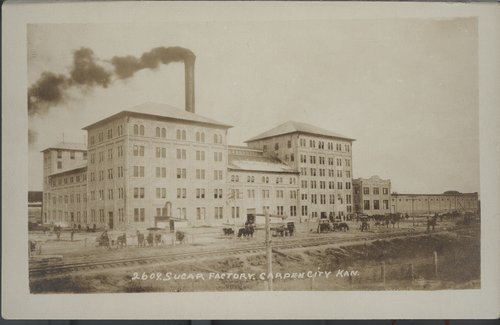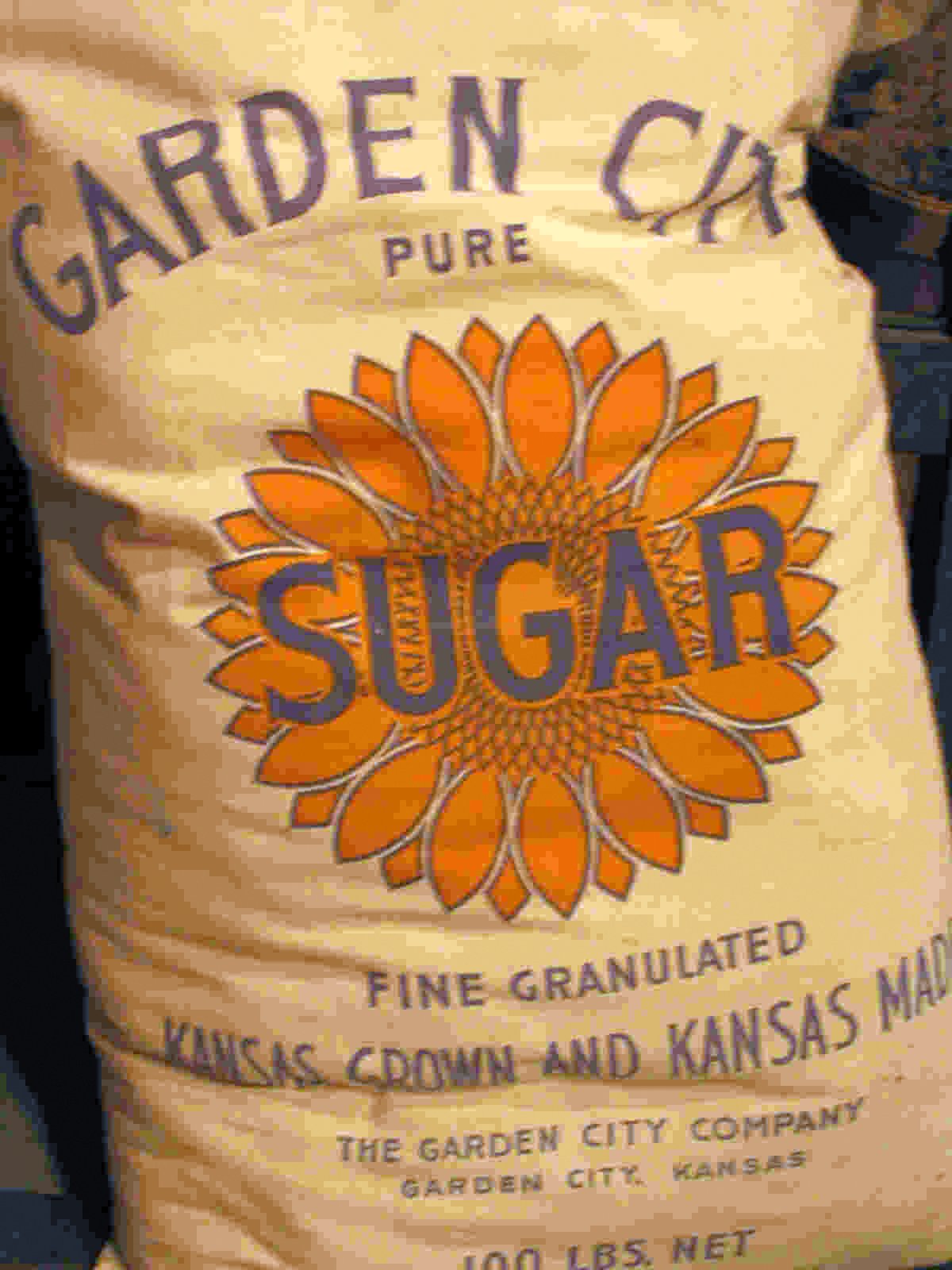Since 1905 the Garden City Sugar Company has had much to do with the development of the Arkansas river valley in Southwest Kansas, and no other one concern has spent more money in improvements in Garden City and surrounding territory. The sugar company has led the way in the progress of the great irrigation system in the Garden City district.
It has built the sugar factory, an alfalfa meal mill, the Garden City Western railroad and an electric power plant. It has built electric power lines through the valley and made it possible for individual farmers to develop their lands with irrigation and to operate their pumping plants with electricity. During the past twenty-five years all of Western Kansas has had its ups and downs, its dry years of short crops and its setbacks on account of other conditions beyond the control of man. But the sugar factory has been in operation every year, and has put into circulation on an average of more than a million dollars a year.
The first movement toward securing a beet sugar factory at Garden City was as follows, and is told by D. R. Menke: "The land we sold to the sugar company was bunched up by Charles Schneider, Ed Wirt and myself early in the spring of 1902. We first purchased the Great Eastern Ditch and then bought about 12,000 acres of land including the townsite of Deerfield in Kearny county, Kansas. Nearly all of this land consisted of abandoned farms along the Great Eastern Ditch and nearly all of it was unimproved. Later on we interested George W. Swink of Rocky Ford, Colorado, and sold him a fourth interest. Mr. Swink was one of the promoters of the Rocky Ford sugar factory.

"After carrying the matter along for about six months we found we needed some outside people to help finance our project. With the assistance of W. B. George, cashier of the First National Bank of Garden City, we succeeded in interesting the shareholders of his bank, who were all bankers in small towns in Missouri. These people secured the money needed and took an interest with us at cost and expenses. In May, 1905, Mr. Swink got in touch with Oliver H. Shoop, R. P. Davie, J. R. McKinnie and others of Colorado Springs, Colorado, and these people looked over our project May 29 and 30, 1905. A proposition was made to us which was approved by our shareholders with-in ten days and a contract entered into about the middle of June, 1905. Mr. Shoop signed the contract for his company and Mr. George as secretary and I as vice-president for our company. A part of the agreement was to build a sugar factory at Garden City."
E. C. Sharer has written a brief sketch of the establishment of the Garden City Sugar Company and its earliest operations:
"During the spring of 1905, George W. Swink of Rocky Ford, and Harry L. Lubers of Las Animas, Colorado, interested }. R. McKinnie, Verne Z. Reed and Oliver H. Shoop of Colorado Springs, in the purchase of 20,000 acres of land located near Garden City. A trip was made to Garden City to look over the land and water rights. Some of the land was under various irrigation ditches, and some was located above the ditches. The price of the land was very cheap and the water rights were included, which were of a very uncertain value. In course of a very short time, R. P. Davie and E. C. Sharer of Colorado Springs became interested and a deal was made to acquire the holdings of the syndicate owning the property. "The location for a good reservoir was found to store water under the Great Eastern Ditch. The Amazon Ditch was being improved and with the pumping plants along the valley in Finney county it seemed possible to contract enough acreage for beet culture to supply a factory of a tonnage of about five hundred tons daily. During previous years enough beets had been grown to demonstrate the kind of soil and the length of the growing season, and to prove the sugar content. With these proven conditions the Colorado syndicate began to look for capital to build a sugar factory. Spencer Penrose, Chas. M. Mac-Neill, Dawson Hawkins and F. A. Gillespie came down to look over the plans and possibilities of a beet sugar factory.
"After a thorough investigation, plans were made to finance a sugar factory, improve ditches and build a reservoir. Ultimately a much bigger and better factory was built than was originally planned. E. H. Every of Colorado Springs interested a number of men to buy securities; among them v^ere Wm. J. Palmer of Colorado Springs and Governor Dodge of Denver, Colorado.

"Garden City and land owners of Finney county responded in a splendid manner, and helped in the promotion in every v^ay. The Santa Fe railroad officially contributed equivalent to half the cost of the freight. This amounted to a considerable item and was most helpful at the inception of the enterprise. What was then needed was farmers, beet growers and dairymen. In time a number of people moved into the county and bought land, others came in and leased land. Garden City enjoyed a splendid growth, and soon became one of the most prosperous towns in Western Kansas."
James Craig says: "I would like to say something of the men who made it possible to have a sugar factory at Garden City. Such men as R. M. Lawrence, D. R. Menke, George Finnup, E. G. Finnup, J. E. Baker, W. M. Kinnison, George Boyd, H. V. Lawrence, and many others who gave of their time and money.
"When the sugar factory interests finally decided to locate the factory at Garden City they asked the people to give them a bonus of $30,000 and secure them 12,000 acres of beets. The next thing was how to raise the bonus. A committee was appointed to take donations of land or money with D. R. Menke, chairman, E. G. Finnup, secretary, and James Craig, treasurer. Some gave money, and many gave ten acres of land and some forty or more acres of land. The sugar company agreed to take the various tracts of land at a fixed price. The deeds were made to the holding committee and after the factory was built the transfers were made to the sugar company."
Expenditures for 1930
Sugar beets $298,680.68
Fuel oil 36,659.87
Lime rock 20,556.80
Coke 7,624.08
Beet seed 25,375.65
Machinery and electrical supplies 70,667.89
Alfalfa hay (for alfalfa meal) 9,328.32
Freight (in-bound only) on above 129,975.19
Freight, out-bound, finished product, over . . 100,000.00
Supplies purchased from local merchants .... 64,805.57
Local payroll (exclusive of Mexican beet labor) 157,500.00
Paid Mexicans for labor on beets 108,240.63
Taxes
Finney county
—
School district No. 1 $ 9,709.36
Holcomb consolidated schools 15,827.07
All others 27,066.42 52,602.85
Kearny county 4,714.75
Grand Total $1,086,732.19
More Resources:
The Sugar Beet Factory images on the Finney County Historical Museum Facebook page.
